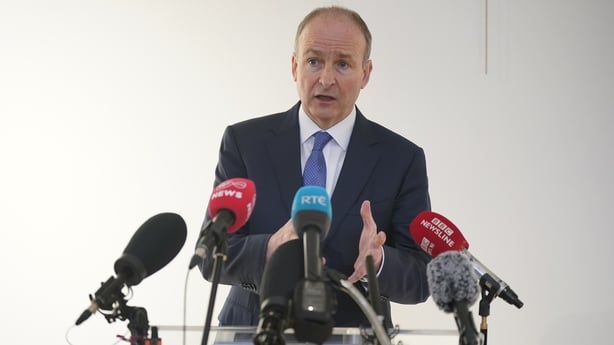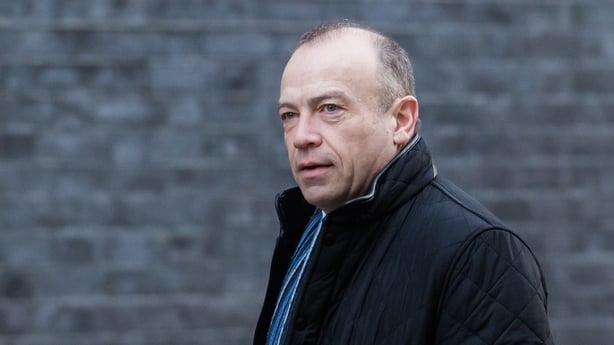Northern Ireland First Minister Michelle O'Neill has said she is "sorry for every single loss of life" when asked about apologising to the families of alleged informers who were killed by the IRA.
It comes after PSNI Chief Constable and former Operation Kenova Lead Jon Boutcher called for both the British government and republican leadership to apologise to the families of those who lost loved ones suspected of being state agents during the Troubles.
He made the call following the publishing of an interim Operation Kenova report - which spent seven years investigating the role of Freddie Scappaticci, the IRA agent known as 'Stakeknife', and his British army handlers.
The Operation Kenova report, which was published this morning, found lives could have been saved by the intelligence he provided.
In some cases the intelligence was not passed on or properly assessed. In others, the security forces decided against intervening because it would have compromised or exposed an informer.
The report is also highly critical of the IRA. It said it had been responsible for "torture, inhumane and degrading treatment and murder, including of children, vulnerable adults, those with learning difficulties and those who were entirely innocent of the claims made against them".
Asked if she accepted that the murder of alleged informants was wrong and if she wanted to take the opportunity to apologise to their families, Ms O'Neill said: "Yes, I've said it before and I'm going to repeat it again today for all those families out there that lost a loved one.
"I am sorry for every single loss of life and that is without exception. That's for every person who was hurt or impacted by our conflict.
"I think it's important that today as the Sinn Féin new generation, Good Friday Agreement generation, that I would repeat that for those families.
"I can only hope - because this is ultimately their day - that they can take some comfort from that."
Ms O'Neill said she is "wholeheartedly committed" to healing the wounds of the past. Ms O'Neill said: "Inter-generational trauma continues to impact so many families decades later. I represent the Good Friday Agreement generation.
"A generation that was born into conflict but who are now in a position, because of that agreement 26 years ago, to build the future in a time of peace.
"This is something that we can never ever take for granted. The hurt and pain caused must never again be repeated and we must always continue to find ways to help people to heal.
"As a republican and a Sinn Féin leader and also as First Minister, I am wholeheartedly committed to healing the wounds of the past, to building this better future that each and every one of us deserve."
Earlier, Tánaiste and Minister for Foreign Affairs Micheál Martin said: "I welcome the strong emphasis in the report on the European Convention on Human Rights, which is an essential safeguard under the Good Friday Agreement.
"In the report, the futility, immorality, and the sordid nature of the Provisional IRA campaign is laid bare.
"The report is clear. The PIRA’s response to those who were supposed to have informed against it was torture and murder.
"The PIRA used torture and inhumane treatment as a deterrent against people working with the security forces.
"Sinn Féin as a political party must accept that the war was wrong, futile and essentially an attack on its own community.
"It should unreservedly apologise and state unequivocally that the PIRA’s activities and actions were wrong."

The report also details a number of examples in which the British security services failed the informers who had been working for them.
On one occasion the IRA abducted a man. Intelligence was passed about where he was being held. It was not passed on to protect an informant and the victim was murdered.
"The report makes clear the challenging circumstances facing those who worked to keep people safe throughout the Troubles," Mr Martin said.
"However, it also states that serious crimes 'were not prevented when they could and should have been'.
"It states Special Branch and the Force Research Unit withheld information in order to protect their agents, with the result very serious offences, including murder were not prevented or investigated.
"Jon Boutcher is clear in his view that 'there can be no meaningful reconciliation following the Northern Ireland Troubles unless and until victims and families know the truth of what happened, however uncomfortable that might be for those involved'.
"Helping secure that truth for victims and families is a collective responsibility."

'Not right for the government to comment'
In a statement following publication of the report, Secretary of State for Northern Ireland, Chris Heaton-Harris, said: "As this is an 'interim' report, I will not comment at this time on behalf of the government on the detail of the report.
"It contains several specific, very serious allegations that remain subject to consideration by the courts.
"It would not be right for the Government to make any comment on the substance of the Interim Report until the conclusion of litigation related to it.
"I note the recent decisions made by the Public Prosecution Service for Northern Ireland in relation to files passed to them by Operation Kenova, which once again go to show how difficult it is to achieve criminal justice outcomes in legacy cases.
"Due to numerous related civil cases, however, that remain ongoing, it would be inappropriate to comment further at this time. There is also the prospect of appeals against any of the recent decisions made by the Director for Public Prosecutions for Northern Ireland.
"I would like to put on record again my deepest sympathy with all the families who lost loved ones during the Troubles - including as a result of the actions of the Provisional IRA."
SDLP leader Colum Eastwood said: "The Operation Kenova interim report sets out in brutal detail the litany of horrors committed by the IRA internal security unit, sanctioned by the IRA leadership and allowed to happen by the British government and security services.
"The abduction, torture and murder of children, vulnerable adults and innocent people approach, in my view, the threshold for what would be considered war crimes in other jurisdictions. There should be no hiding place for those involved or those who looked the other way to protect intelligence assets."

